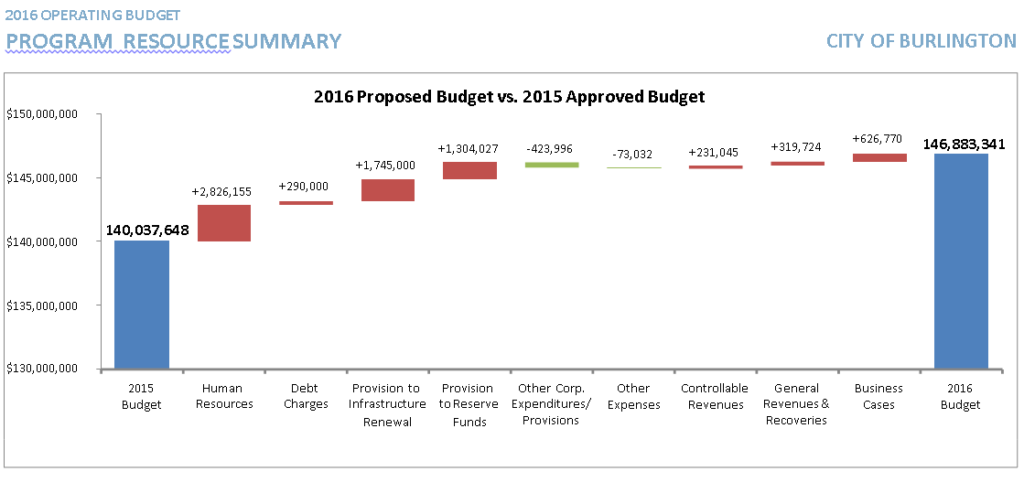![]() By Pepper Parr
By Pepper Parr
September 8, 2016
BURLINGTON, ON
City council will return to meeting in the council camber – and in the very near future – they will begin to look at the budgets they have to put in place for the 2016/17 fiscal year.
The numbers available at this point in time don’t look very encouraging.

Human Resources costs are up 2.8% primarily due to increases to union and non‐union compensation.
Operating/Minor Capital Equip. The 0.6% increase is primarily due to higher electricity rates and increased costs for parts and equipment. These increases are partially offset by lower expenses on general office equipment.
Purchased Services Decrease of 0.9% is attributable to lower external service requirements. These savings are partially offset by higher computer, software and vendor hosted solutions as well as increased snow removal expenses.
Corp. Expenditures/Provisions Increase of 6.7% is mostly due to the infrastructure renewal levy and debt charges incurred for the accelerated renewal program. Additionally debt charges for the Joseph Brant Hospital are offset from the reserve fund (offset by recovery in General Revenues & Recoveries).
Controllable Revenues are down 0.6% due to realignment of Transit Fare revenue to be in line with actual receipts, which is is partially offset by improved revenues in other services.
General Revenues & Recoveries The increase of 4.2% in General Revenues & Recoveries is mostly due to increase in Hydro dividend and Federal Grants, in addition to a recovery for debt charges from Joseph Brant Hospital reserve fund.
Business Cases The 2016 Proposed Budget includes 16 City business cases totaling $438K. They include proposals to address climate change (stormwater water drainage), enhanced bylaw enforcement, community investment and reduced seniors’ transit fare.
Additionally there are two business cases proposed by the Burlington Performing Arts Centre totaling $188K for community engagement and enhanced customer service.
A graphic of the spending shows where the city feels they need to spend your dollars.

Infrastructure, salaries & wages and tucking money into the reserve funds are where additional funds are needed.
Increases in the 4% plus range are hard to swallow when inflation is running at less than 2%
There are going to be some interesting discussions around the council table in the months ahead.
The steps staff and council will take to get a budget passed is as follows:
- Capital Budget Overview November 21, 2016
- Capital Council Information Session November 24, 2016
- Public Engagement July – November 2016
- Capital Budget Review December 8, 2016
- Operating Budget Overview December 8, 2016
- Operating Council Information Session December 15, 2016
- Council Capital Budget Approval December 19, 2016
- Operating Budget Review January 19, 2017
- Council Operating Budget Approval January 23, 2017




















No evidence of zero-based budgeting by this mayor and council. City taxes (let’s not hide behind the “overall tax increase” which Goldring is so fond of doing) have been increasing more than the rate of inflation during Goldring’s tenure–a “tax and spender” indeed!
Road diets are just one of several examples of frivolous expenditures where the City’s lack of prudent financial management has led to waste and unnecessary expenses. There are a number of other things that require critical examination and review over and above just looking at pretty numbers on a balance sheet:
– program management – e.g. mundialization is a nice concept, but what does the City get in return for it? If it doesn’t yield tangible financial benefits in the forms of jobs or economic growth, or provide signficiant service to the public then let’s stop subsidizing it.
– overtime – how much money is the City spending on overtime payments for City workers, and were these expenditures really necesary? Let’s see a detailed breakdown of why overtime was necessary.
– police budgets – no one questions or argues with the need for police enforcement but do we really need a police officer dispatched to oversee construction initiatives and traffic monitoring at every major construction site?
– event management – road races are nice, but how much does the City spend to promote and sponsor these events, and do the financial benefits outweigh the costs? Where is the benefit-cost analysis? Have local merchants been surveyed to determine whether these events bring in the revenue that is claimed?
– salary expenditures and cost controls – how does Burlington compare with comparably sized municipalities such as Cambridge, St. Catharines, Guelph or Oakville? How many senior managers are there, and how do the number of personnel and salary levels compare?
– fines and penalties – if people insist on engaging in anti-social behaviours (e.g. excessive noise; dumping chemicals and garbage in public places; graffiti; etc.) then they should expect to be charged and fined accordingly. The cost of fines and penalties should be increased significantly as a deterrent for bad behaviour and to increase revenues.
Finally, a 2.8% tax increase at a time when the economy is performing badly and many employees aren’t even keeping pace with the cost-of-living is no longer sustainable. We need to send the City’s Budget Chief a really strong message to tighten up and start exercising meaningful controls or else start looking for a new job!
Here’s an idea: How about rather than gouging us and asking us for more money every year, they take a serious look at their spending and start cutting things that aren’t necessary? $200,000 New Street “road diet” – didn’t need to spend that. $100,000 on 5 pieces of art – didn’t need to spend that. Those are just recent examples, but the list goes on and on. Burlington is quickly becoming a very unaffordable place to live. Another 5 years at this pace and it will be a city of millionaires, but nobody else.